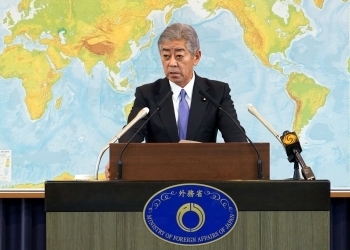Press Conferences
Press Conference by Foreign Minister IWAYA Takeshi
Friday, January 31, 2025, 5:25 p.m. Ministry of Foreign Affairs
Japanese
Opening Remarks
Women, Peace and Security (WPS) Focal Points Network Tokyo Meeting
Mr. IWAYA Takeshi, Minister for Foreign Affairs: I have an announcement at the outset.
From February 4 to 6, the Women, Peace and Security (WPS) Focal Points Network Tokyo Meeting will be held.
This network has the participation of 93 United Nations (UN) Member States and 10 regional organizations. It is a global network that shares lessons learned and best practices regarding women’s participation in peace and security fields and works to strengthen WPS-related initiatives.
This year marks the 25th anniversary of the adoption of the UN Security Council Resolution that initiated WPS, and Japan will serve as co-chair of this network with Norway. This is the first time the meeting will be held in Asia.
As co-chair, Japan hopes to deepen discussions on the importance of women’s participation in peace mediation and peacebuilding, WPS’s application to disaster risk reduction, and responses to new issues arising from technological progress.
That is all from me.
Recommendation to Japan by the United Nations Committee on the Elimination of Discrimination against Women (CEDAW)
Asahi Shimbun, Satomi: I have a question on the measures announced at the Foreign Press Secretary’s recent press conference related to Japan’s contributions to CEDAW. According to the recent announcement, Japan communicated that the contributions it makes through the Office of the United Nations High Commissioner for Human Rights (OHCHR) should not be used for CEDAW. While some support this measure, some are of the view that CEDAW’s unacceptable recommendation on the Imperial House Law should be countered by discourse, and that an economic coercion measure is entirely undesirable. What is your opinion on the fact that the measure is perceived as economic coercion? Please tell us the nature of this measure.
Minister Iwaya: First, I would like to explain the background. Japan has repeatedly explained its position carefully and sincerely to CEDAW, both during its consideration process and afterwards. It is deeply regrettable that, nevertheless, Japan’s request to delete the reference to the Imperial House Law was not accepted. Taking this seriously, the Government examined the matter and reached the said decision.
This measure was taken in response to CEDAW’s recommendation to amend the Imperial House Law.
Japan believes that the active participation of women and gender equality are essential elements for realizing a society where everyone can find fulfillment and where diversity is respected, as well as for achieving the sustainable development of Japan’s economy and society. This belief remains unchanged. From this perspective, we will continue to work with CEDAW.
Accordingly, we consider that the measure’s characterization as economic coercion does not apply.
Incident Involving an Intruder at the Dormitory for House of Representatives Members
NTV, Mori: I would like to ask about the incident involving an intruder at your residence. Last night, you stated to reporters that the incident did occur. Could you tell us when this incident took place, whether you knew the female intruder, and whether your residence was locked? Please also share with us your thoughts on the incident, and what measures you seek from security to prevent the recurrence of such incidents.
Minister Iwaya: It is true that there was an incident in which an unfamiliar person intruded into my residence or my room at the Akasaka dormitory for House of Representatives members. However, I would like to refrain from providing further details as doing so may cause various security hinderances.
In any case, it goes without saying that such an incident should not occur. Following this incident, I understand that security measures, including those taken by the security company, are being strengthened, which I have also requested.
Timing of the Japan-U.S. Summit Meeting
NHK, Yonezu: Today, media outlets reported on the date and other details of the Japan-U.S. Summit Meeting. The information is that it will be held on February 7, local time, in Washington, DC. Could you clarify the facts? Moreover, what kind of a Japan-U.S. Summit Meeting would be desirable in your opinion?
Minister Iwaya: The date has not been finalized yet. Ever since the Trump administration took office, we have been continuously calling for or holding talks and coordinating to hold a Japan-U.S. Summit Meeting between Prime Minister Ishiba and President Trump as soon as possible, and we expect the date to be finalized in the not-distant future.
If the Summit Meeting is realized, it will be the first Japan-U.S. Summit Meeting since the inauguration of the Trump administration. First, I hope that it will firmly establish a relationship of trust between the two leaders. I also hope that it will be a fruitful meeting for elevating the Japan-U.S. Alliance to even greater new heights for the benefit of not only the two countries but also the region and the world.


